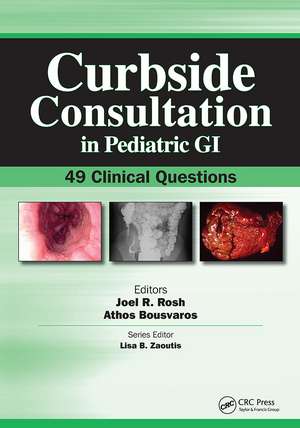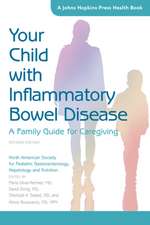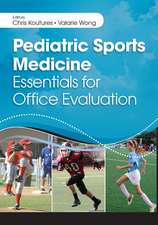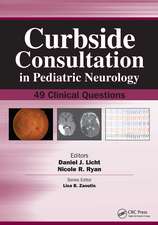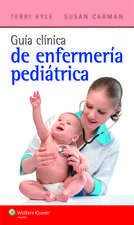Curbside Consultation in Pediatric GI: 49 Clinical Questions: Curbside Consultation in Pediatrics
Autor Joel Rosh, Athos Bousvarosen Limba Engleză Paperback – 15 feb 2013
Drs. Joel R. Rosh and Athos Bousvaros have designed this unique reference which offers expert advice, preferences, and opinions on tough clinical questions commonly associated with pediatric GI. The unique Q&A format provides quick access to current information related to pediatric GI with the simplicity of a conversation between two colleagues. Numerous images, diagrams, and references allow readers to browse large amounts of information in an expedited fashion.
Some of the questions that are answered:
- How is infantile colic diagnosed and treated?
- How is GERD diagnosed in infants and what are the best treatments?
- How can I optimize my treatment of childhood constipation and does this vary by age?
- How can I effectively intervene in a child that is overweight or obese?
- Celiac disease seems so much more common—is this an epidemic?
- Why have food allergies become so common and what are the most accurate means of diagnosis?
Preț: 850.74 lei
Preț vechi: 895.51 lei
-5% Nou
Puncte Express: 1276
Preț estimativ în valută:
162.78€ • 170.45$ • 135.02£
162.78€ • 170.45$ • 135.02£
Carte tipărită la comandă
Livrare economică 10-24 aprilie
Preluare comenzi: 021 569.72.76
Specificații
ISBN-13: 9781617110146
ISBN-10: 1617110140
Pagini: 292
Dimensiuni: 178 x 254 x 18 mm
Greutate: 0.64 kg
Ediția:1
Editura: CRC Press
Colecția CRC Press
Seria Curbside Consultation in Pediatrics
ISBN-10: 1617110140
Pagini: 292
Dimensiuni: 178 x 254 x 18 mm
Greutate: 0.64 kg
Ediția:1
Editura: CRC Press
Colecția CRC Press
Seria Curbside Consultation in Pediatrics
Public țintă
Professional Practice & DevelopmentCuprins
Contents Dedication Acknowledgments About the Editors Contributing Authors Foreword by Richard J. Grand, MD Introduction SECTION I COMMON PROBLEMS IN INFANCY Question 1 How Is Infant Colic Diagnosed and Treated? Audra S. Rouster, MD and Paul E. Hyman, MD Question 2 What Are the Causes of Rectal Bleeding in Infants? Natalie Sikka, MD and Ian Leibowitz, MD Question 3 How Is Gastroesophageal Reflux Disease Diagnosed in Infants and What Are the Best Treatments? Charles P.B. Vanderpool, MD and Sandeep Gupta, MD, AGAF, FACG, FASGE, FAAP Question 4 What Is the Normal Stooling Pattern for an Infant and What Medications Can I Safely Use for a Constipated Infant? Silvana Bonilla, MD and Alejandro F. Flores, MD Question 5 Reflux and Vomiting in Infants Are so Common, When Should I Send an Infant for Evaluation Especially to Exclude Anatomic and Metabolic Diseases? Colin Rudolph, MD, PhD Question 6 Why Do Some Infants Feed Poorly and What Interventions Are Best for These Infants and Their Parents? Douglas G. Field, MD and Keith E. Williams, PhD Question 7 How Long Do I Follow a Newborn With Prolonged Jaundice and How Much Work-Up Should I Do Before Sending the Child to a Specialist? Henry Lin, MD and David A. Piccoli, MD Question 8 What Is the Correct Management and Follow-Up for Infants Whose Mothers Are Infected With Hepatitis B? Douglas Mogul, MD, MPH and Kathleen B. Schwarz, MD Question 9 What Is the Correct Management and Follow-Up for Infants Whose Mothers Are Infected With Hepatitis C? Janis M. Stoll, MD and Maureen M. Jonas, MD SECTION II PATIENTS WITH STATIC ENCEPHALOPATHY Question 10 How Do I Assure Adequate Nutrition Support for the Child or Adolescent With Static Encephalopathy and When Should I Consider Supplemental Enteral Support Such as Gastrostomy Feeding? Edwin F. Simpser, MD Question 11 What Evaluation Strategies and Treatment Options Are Available to Children With Cerebral Palsy With Chronic Constipation? Nader N. Youssef, MD Question 12 When Is It Time to Consider Antireflux Surgery in a Child or Adolescent With Static Encephalopathy? Judith M. Sondheimer, MD SECTION III DISORDERS OF DEFECATION Question 13 What Is the Differential Diagnosis for a Child With the Symptom of Constipation and How Does It Vary by Age? Lusine Ambartsumyan, MD and Samuel Nurko, MD, MPH Question 14 How Can I Optimize My Treatment of Constipation and Does This Vary by Age?1 Warren P. Bishop, MD Question 15 Why Do Children Develop Fecal Incontinence and What Diagnostic Evaluation and Treatments Are Best for Those Affected With It? Vera Loening-Baucke, MD and Alexander Swidsinski, MD SECTION IV NUTRITION Question 16 How Can I Effectively Intervene in a Child That Is Overweight or Obese? Jeannie Huang, MD, MPH Question 17 What Comorbidities Should I Screen for in My Patient Who Is Obese? Nidhi P. Goyal, MD, MPH and Jeffrey B. Schwimmer, MD Question 18 What Work-Up Should Be Considered for the Infant or Toddler Who Is Gaining Weight Slowly? What Interventions Are Effective? Frank R. Sinatra, MD Question 19 How Common Is Lactose Intolerance and How Can I Diagnose It? Is There a Downside to Making the Diagnosis Based on History? Sonia K. Michail, MD, CPE, FAAP, AGAF Question 20 Are There Patient Populations at Risk for Vitamin D Deficiency? How Do I Diagnose and Treat It? Francisco A. Sylvester, MD and Ashley Casserino, MD SECTION V LIVER Question 21 What Conditions Commonly Cause Elevated Bilirubin and Aminotransferase Levels in School-Aged Children? Jaime Echartea, MD and William F. Balistreri, MD Question 22 Many of My Obese Patients Have Elevated Liver Chemistries. What Should My Approach Be to This Finding? Ali A. Mencin, MD and Joel E. Lavine, MD, PhD Question 23 What Routine Health Maintenance Should I Assure for My Pediatric Patient Who Has Undergone Liver Transplantation? Michael R. Narkewicz, MD SECTION VI DISORDERS OF THE PANCREAS Question 24 Congenital Screening for Cystic Fibrosis Is Now the Routine in Many States. Are There Still Clinical Scenarios That Can Be Seen in Practice That Warrant Suspicion for Cystic Fibrosis? Tanja Gonska, MD Question 25 What Causes Recurrent Pancreatitis in Children? Narayanan Venkatasubramani, MBBS, MD and Steven L. Werlin, MD Question 26 Exocrine Pancreatic Insufficiency Is Unusual in Pediatrics. Are There Clinical Conditions Other Than Cystic Fibrosis That Can Cause Pancreatic Insufficiency? Kathy D. Chen, MD and Sohail Z. Husain, MD Question 27 How Should I Use Pancreatic Enzymes in Children With Cystic Fibrosis and Other Causes of Pancreatic Insufficiency? Mark E. Lowe, MD, PhD and Douglas Lindblad, MD SECTION VII UPPER GASTROINTESTINAL AND SMALL BOWEL TOPICS Question 28 Celiac Disease Seems So Much More Common. Is This an Epidemic? Ivor D. Hill, MB, ChB, MD Question 29 Are There Groups Who Are at an Increased Risk for Celiac Disease That Should Be Screened? Thomas Flass, MD, MS and Edward J. Hoffenberg, MD Question 30 What Is the Best Way to Diagnose Celiac Disease? What Is the Role of Human Leukocyte Antigen Typing, Serology, and Small Intestinal Biopsy? Alan M. Leichtner, MD and Dascha C. Weir, MD Question 31 Why Have Food Allergies Become So Common and What Are the Most Accurate Means of Diagnosis? Scott H. Sicherer, MD Question 32 What Is Eosinophilic Esophagitis and What Do I Do About It? Shauna Schroeder, MD and Glenn T. Furuta, MD Question 33 My Preteenaged Patient Has Chronic, Recurrent Epigastric Pain and a Blood Test Showed Immunoglobulin-G Antibodies Against Helicobacter pylori. Should I Start Helicobacter pylori-Eradication Therapy or Am I Missing Something? Benjamin D. Gold, MD, FAAP, FACG Question 34 Is Gastroesophageal Reflux Disease Really Common in Children and Adolescents? What Are the Best Ways to Diagnose and Treat It? Steven J. Czinn, MD, FAAP, FACG, AGAF; Samra S. Blanchard, MD; Anayansi Lasso-Pirot, MD; and Adam Paul, DO Question 35 What Testing Is Needed to Make the Correct Diagnosis in Children and Adolescents With Recurrent Abdominal Pain? Silvana Bonilla, MD and Miguel Saps, MD Question 36 What Treatments Are Available for Pediatric Recurrent Abdominal Pain and Which Ones Actually Work? Jonathan E. Teitelbaum, MD Question 37 Acute Diarrhea Is Usually Infectious, but What Causes Recurrent or Persistent Diarrhea and How Should I Evaluate Such a Condition? Harland Winter, MD Question 38 Is There a Role for Probiotics in Children With Recurrent Gastrointestinal Symptoms Such as Diarrhea or Abdominal Pain? Stefano Guandalini, MD and Catherine D. Newland, MD SECTION VIII INFLAMMATORY BOWEL DISEASE Question 39 What Is the Current Understanding of the Etiology of Inflammatory Bowel Disease? Lindsey Albenberg, DO and Robert N. Baldassano, MD Question 40 How Are the Different Types of Inflammatory Bowel Disease Diagnosed and Classified? Jeremy P. Middleton, MD and Subra Kugathasan, MD Question 41 Are There New Classes of Inflammatory Bowel Disease Therapies of Which I Should Be Aware? Bella Zeisler, MD and Jeffrey S. Hyams, MD Question 42 How Do I Know If My Patient With Inflammatory Bowel Disease Is Truly in Remission and Doing Well? Peter Church, MD and Anne M. Griffiths, MD, FRCPC Question 43 What Routine Health Maintenance Is Needed for the Pediatric Inflammatory Bowel Disease Patient? Emily R. Perito, MD, MAS and Melvin B. Heyman, MD, MPH Question 44 How Can I Facilitate the Transition of My Adolescent Patient With Inflammatory Bowel Disease to the Adult Health Care Team? Namita Singh, MD and Marla Dubinsky, MD Question 45 Are There Emotional Issues That Are Commonly Seen in Pediatric Inflammatory Bowel Disease That I Should Look for in My Patients and Their Families? Laura Mackner, PhD and Wallace Crandall, MD Question 46 What Do We Know About Adherence in Inflammatory Bowel Disease and Any Chronic Pedia
Notă biografică
Joel R. Rosh, MD graduated from Brown University and received his medical degree from the Albert Einstein College of Medicine in New York. His postdoctoral training included a pediatric residency at the Children's Hospital of New York—Columbia Presbyterian Medical Center and a Clinical Fellowship in Pediatric Gastroenterology at the Mount Sinai Hospital in New York. He has been on the faculty of the University of Medicine and Dentistry of New Jersey, as well as the medical schools of Mount Sinai and New York's Columbia Presbyterian Hospital. Dr. Rosh is a Fellow of the American Academy of Pediatrics, the American College of Gastroenterology, and the American Gastroenterological Association. He has served as a National Counselor for the North American Society of Pediatric Gastroenterology, Hepatology, and Nutrition, and as the National Chairman of the Pediatric Education Committee for the Crohn’s and Colitis Foundation of America.
Athos Bousvaros, MD, MPH obtained his BA from Williams College, MD from Duke University School of Medicine, and completed a Master's of Public Health at the Harvard University School of Public Health. After completing his pediatric residency at Duke, he trained in the Combined Program in pediatric gastroenterology and nutrition at Boston Children's Hospital and Massachusetts General Hospital. He is currently the Associate Director of the Inflammatory Bowel Disease Program at Boston Children’s Hospital, and an Associate Professor of Pediatrics at Harvard Medical School. Dr. Bousvaros is currently the President of the North American Society of Pediatric Gastroenterology and Nutrition. Dr. Bousvaros spends what little spare time he has with his family and his comic book collection. He would like to thank his patients, who are also his greatest teachers.
Athos Bousvaros, MD, MPH obtained his BA from Williams College, MD from Duke University School of Medicine, and completed a Master's of Public Health at the Harvard University School of Public Health. After completing his pediatric residency at Duke, he trained in the Combined Program in pediatric gastroenterology and nutrition at Boston Children's Hospital and Massachusetts General Hospital. He is currently the Associate Director of the Inflammatory Bowel Disease Program at Boston Children’s Hospital, and an Associate Professor of Pediatrics at Harvard Medical School. Dr. Bousvaros is currently the President of the North American Society of Pediatric Gastroenterology and Nutrition. Dr. Bousvaros spends what little spare time he has with his family and his comic book collection. He would like to thank his patients, who are also his greatest teachers.
Descriere
Curbside Consultation in Pediatric GI: 49 Clinical Questions provides quick answers to the tricky questions most commonly posed during a "curbside consultation" between pediatricians.
